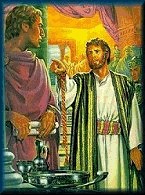 |
 |
|
Is it possible that the "devastations of Jerusalem," as spoken of at Daniel 9:2, began several years prior to its destruction, perhaps commencing with the initial exile? At Daniel 9:1-2 we read: "In the first year of Darius the son of Ahasuerus of the seed of the Medes, who had been made king over the kingdom of the Chaldeans; in the first year of his reigning I myself, Daniel, discerned by the books the number of the years concerning which the word of Jehovah had occurred to Jeremiah the prophet, for fulfilling the devastations of Jerusalem, [namely,] seventy years." The Hebrew word translated "devastations" at Daniel 9:2 is chorbâh. Please note that Daniel refers to "the word of Jehovah [that] had occurred to Jeremiah." This is more or less a direct reference to Jeremiah 25:11, where the same Hebrew word is used:
It is important that we identify exactly when the devastation of Jerusalem took place if we are to correctly understand the prophecy concerning the seventy years. In order to understand what Daniel meant by the "devastations of Jerusalem," we need to understand what Jeremiah meant by the land becoming "a devastated place." Additionally, we must comprehend the extent or magnitude of devastation that the Hebrew word chorbâh signifies. At this point, one thing is certain. Since the prophecy at Jeremiah 25:11 "occurred to Jeremiah . . . in the fourth year of Jehoiakim" (Jeremiah 25:1), we know for a fact that the devastation of Jerusalem did not begin with the supposed siege and captivity that critics place in Jehoiakim's third regnal year, due to a misunderstanding of Daniel 1:1. Why? Because the words, "all this land must become a devastated place," stated at Jeremiah 25:11, show that the devastation was to be a future event. This is confirmed at Jeremiah 26:9, which states that "this very city will be devastated." Furthermore, scholars who accept present-day secular chronology cannot suggest that the seventy years of devastation (Daniel 9:2) commenced with the first Biblically-recorded exile, which occurred in the seventh year of Nebuchadnezzar (Jeremiah 52:28), since this would account for a total, by their reckoning, of just under sixty years. The English word devastate, the noun form of which is used at Daniel 9:2 and the adjective form at Jeremiah 25:11, is defined as: "to lay waste; ravage" (Webster's) or, "to lay waste; destroy" (American Heritage). We have already seen that the Hebrew word used in both of these instances is chorbâh. Some critics have gone as far as to state that this word does not imply complete destruction, so as to suggest that the "devastation" began prior to the destruction of Jerusalem. However, the Hebrew and Aramaic Dictionary of the Old Testament by Dr. James Strong (1890), defines chorbâh as: "a place laid waste, ruin, waste, desolation." Similarly, A Hebrew and English Lexicon of the Old Testament (Oxford, 1959), defines chorbâh as: "waste, desolation, ruin." Thus, the meaning of chorbâh is closely related to the Hebrew word shâmêm, translated at 2 Chronicles 36:21 as "desolated." In fact, it is so closely related, that although the New World Bible Translation Committee opted to translate chorbâh as "devastations" (likely to preserve the subtle shade of difference between the two Hebrew words), other Bibles have translated chorbâh at Daniel 9:2 as follows:
Now, please note how the following Bibles translate chorbâh where it appears at Jeremiah 25:11:
We are beginning to get a sense of the magnitude of the devastation that was to befall Judah. But does Jeremiah anywhere specifically qualify what this devastation would entail? Jeremiah 26:9 answers:
To what extent would Jerusalem be devastated? The Scriptures reveal that the city would be devastated so as to be without an inhabitant. Throughout the book of Jeremiah, the prophet continually and consistently confirms what he had in mind when he wrote Jeremiah 25:11:
Furthermore, the extent of devastation, recorded at 2 Chronicles 36:19-21 as resulting from the destruction of Jerusalem, was foretold by the prophet Isaiah over 120 years in advance:
It goes without saying that Judah was not made a "desolate wasteland" (NIV) or a "ruin and a waste" (NRSV), "without an inhabitant," at any point prior to the destruction of Jerusalem. Thus, can it honestly be said that Jerusalem was devastated as a result of the initial exile? Specifically referring to that event, historian Max I. Dimont provides the answer:
In speaking to the "Jews that were dwelling in the land of Egypt" (Jeremiah 44:1) who fled there following the destruction of Jerusalem, Jeremiah establishes the matter beyond all doubt:
The above verses show that Jeremiah's prophecy that "this land must become a devastated place" (Jeremiah 25:11) began to be fulfilled after the destruction of Jerusalem, and that it encompassed the complete desolation of the land. Daniel 9:2 confirms that this "desolation of Jerusalem would last seventy years."—Daniel 9:2, NIV.
|
| Home
| Contents Last revised: 97/11/09. Copyright © 1997 by Jehovah's Witnesses—Setting the Record Straight. All rights reserved. This web site is not affiliated with or sanctioned by the Watchtower Bible and Tract Society. However, every effort has been made to adhere to the current views published by the "faithful and discreet slave" (Matthew 24:45; Luke 12:42) through the Watchtower Bible and Tract Society. The "Official Web Site of Jehovah's Witnesses" can be found at http://www.jw.org, and should be recognized as the authoritative source about the beliefs, teachings, and activities of Jehovah's Witnesses. |